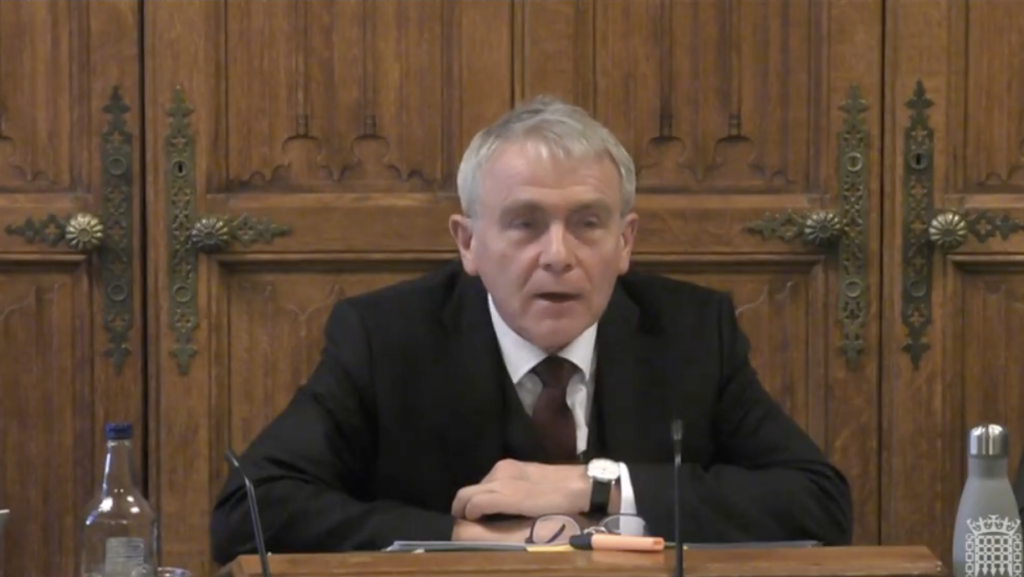The chair of the Environment, Food and Rural Affairs (EFRA) Committee has expressed disappointment, after Defra failed to provide the clarity hoped for about how the new border controls will be implemented.
EFRA chair Sir Robert Goodwill wrote to the Department seeking fuller answers, in the wake of reports that, while the next stage of the new Border Target Operating Model, including physical checks of medium risk products, officially began on April 30, it will get underway with a very light touch.
A report in the Financial Times said the Government has told the country’s port authorities that it would not ‘turn on’ the import checks on April 30 because of the risk of ‘significant disruption’.
In a presentation seen by the FT, Defra indicated the new border systems will not be fully ready and outlined a plan to avoid ‘big delays’ due to queues of lorries at ports. This reportedly involves initially setting the rate of checks ‘to zero for all commodity groups’ in what it called a ‘phased implementation approach’, with systems ‘progressively turned on’ for different product groups.
Defra refuted the report, insisting the government has ‘full confidence that the facilities, infrastructure and systems at the border, will be ready for April 30’.
But in a letter to Defra Secretary Steve Barclay, Sir Robert called for a ‘clear and unambiguous explanation’ as to how import checks will be rolled out from April 30.
He expressed concern that the Government’s light touch approach is a ‘sixth delay to the implementation of SPS import checks in all but name’.
Sir Robert asked Defra to clarify ‘what a ‘graduated’ or ‘light touch’ approach to the measures look like in practice’, what percentage of new SPS checks will take place from April 30 in each risk category and when the measures will be scaled up to their intended capacity.
Defra response
In reply, Defra Minister Lord Douglas-Miller said its ‘graduated’ or ‘light touch’ approach ‘recognised that the introduction of these essential new controls could pose challenges initially for business’.
“Our graduated approach will minimise disruption while protecting our biosecurity: which benefits everyone, especially traders.
“Competent authorities will be encouraged to take proportionate action on non-compliances identified which do not pose a significant risk to public, human, animal, or plant health,” he said.
He added that, from April 30, commodities categorised as high-risk which will see existing ID and physical inspections relocated from destination to border control posts.
Defra expects remote documentary checks on medium-risk animal products will be undertaken at 100%, and on medium-risk plant products from the EU at 3% typically, as specified in the published Border Target Operating Model.
“We will build up to full ID and physical check rates to ensure a pragmatic and phased approach to both protect biosecurity and minimise disruption. Physical and ID checks for medium-risk goods are in place from today (April 30). Checks will initially focus on those commodities that present the greatest risk, and will build up to full inspection numbers over time,” he said.
He added that it was never Defra’s intention that the ‘end state for check rates would be achieved on April 30, given the time needed for industry and competent health authorities to acclimatise to the new requirements’.
Disappointed
Sir Robert (main picture) was not satisfied with Defra’s answers, however. “The UK’s departure from the EU presented an opportunity to improve our biosecurity at the border against diseases such as African swine fever,” he said.
“Defra has said that there will be graduated approach to the introduction of checks and that they will be building up to full inspection rates over time, but it is disappointing that they have been unable to provide clear answers on when the measures will be scaled up to their intended capacity.
“We remain concerned about the measures that will be in place to safeguard against the potential non-compliance which could take place between the point of entry at the Port of Dover and Sevington, 22 miles away.”
The latest exchange comes as ITV News reports that imports of food and plants from the EU are being waved through customs even if they have incorrect paperwork.
While 33% of declarations from the EU are being rejected at Dover because of errors, Defra said that ‘to avoid disruption at the border, those with minor errors should be waved through’ and full border controls shoud be imposed ‘as soon as possible’.
“Full border checks are not being applied at Dover, as of today, but full border charges are,” the reporter said.
There is also widespread reporting on the costs to businesses of the border checks – the BBC reports that they will cost one business £225,000 per year.




